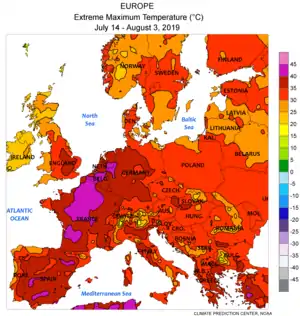Climate change in the Netherlands
Climate change in the Netherlands is already affecting the country. The average temperature in the Netherlands has risen by almost 2 degrees Celsius from 1906 to 2017. The global average temperature has risen by 1 degree Celsius.[1] The Netherlands has the fourth largest Co2 per capita emissions of the European Union.[2] These changes have resulted in increased frequency of droughts and heatwaves. Because significant portions of the Netherlands have been reclaimed from the sea or otherwise are very near sea level, the Netherlands is very vulnerable to sea level rise.
.png.webp)
The Dutch government has set goals to lower emissions in the next few decades. The Dutch response to climate change is driven by a number of unique factors, including larger EU policies Green recovery plans by the European Union in the face of the COVID-19 and a climate change litigation case, State of the Netherlands v. Urgenda Foundation, which created mandatory climate change mitigation through emissions reductions 25% below 1990 levels.[3][4] In the end of 2018 carbon emissions were down 15% comparing to 1990 levels. The goal of the Dutch government is to reduce emissions in 2030 by 49%.
Impact

The temperature has risen by an average of 1 degrees Celsius globally in the last 130 years, while in The Netherlands the average temperature has risen by 1.7 degrees Celsius in that time. The sea level has risen 20 centimetres.[5]
Temperatures
The top 5 of the highest average temperature in a year were all in the last two decades with 2014 having the highest average temperature of 11.7 degrees Celsius.[6] The last 121 years the KNMI has kept record of the heatwaves in The Netherlands, 29 heatwaves have occurred since then, 14 heatwaves occurred in the last 21 years. 5 heatwaves occurred during the last 3 years with 2018 and 2019 having two heatwaves a year. In the first heatwave of 2019 there was a record temperature of 40.7 degrees Celsius in Gilze en Rijen. The last few years heatwaves have been stronger than expected. Scientists expected that temperatures would increase 1.5 degrees Celsius during a heatwave but when measured it points out that it is actually 3 degrees Celsius.[7][8][9]
Droughts
In the summer of 2018, there was a big drought. 2018 is one of the top 5 years with the lowest rainfall in The Netherlands, with it having a shortage of 309 millimetres of rain. The drought had the biggest impact inland and less of an impact in the coastal areas. 2019 was also drier than it would be normally.[10]
Sea level rise

The sea level has risen about 12 to 20 centimeters from 1902-2010. The rate at which the sea level is rising has increased. In the last few years it has risen twice as fast compared to the 20th century, with a rise of 4 to 5 millimeters every year. The rate at which the sea level is rising is still increasing.[11] The sea level rise in 2100 is expected to be 1 meter in the worst case scenario.[12] The Dutch government says that the current protection is adequate until 2050.[13]
Public response
Public opinion
The European Commission released a report in 2019 which found that 74% of Dutch people see climate change as a severe problem.
The Social Cultural Planning Bureau (SCP) found that Climate Change was the second biggest concern from the Dutch public.
Ipsos polled Dutch people in late 2020 about climate change, commissioned by the Dutch bank ABN AMRO. Two in five dutch people see the COVID-19 pandemic as an wake-up call for the climate. 75% of respondents want that the 'positive changes' from the COVID-19 pandemic like the reduction of Co2 emissions caused by a reduction of traffic and flights should stay. 50% would permanently change their travel habits for that goal. A majority of the respondents wants that COVID-19 financial relief packages should also have the goal to make the Netherlands sustainable in a faster pace.[14]
The European Investment Bank conducted polls across the European Union in 2020-2021. The poll showed that Dutch people find it easiest to give up flying with 40% of respondents giving that answer. After flying there is meat (19%), video streaming (17%), new clothes (12%) and their car (10%). Giving up their car was the most difficult option at 40%. 9% of respondents said that are making radical lifestyle changes to combat climate change which is lower than the EU average which is 19%. People aged between 15 and 29 are trying to make to most efforts to combat climate change at 77%. 22% of respondents said that they will avoid to fly after the pandemic has ended, 30% said that they would go on vacation in the Netherlands or in nearby countries and 36% said that they would continue their previous flying habits, which is higher than the EU average (31%).[15]
Protests
Numerous protests have been held with the biggest protest drawing 40.000 people in Amsterdam on 10 March 2019.[16]
Extinction Rebellion has also demonstrated in the Netherlands with actions as blocking traffic on one of the busiest road in Amsterdam in front the Rijksmuseum[17] and blocking traffic in other parts of the country as well as other actions.[18][19][20][21] Extinction rebellion together with Greenpeace organized a demonstration in the airport Schiphol, 26 protesters were arrested.[22][23]
Youth for climate
The first big demonstration that was organized by Youth for Climate was on 7 February 2019 in The Hague. Youth for Climate estimated that 15.000 students protested.[24] A second strike took place on 14 March 2019 in Amsterdam. With 5.000 to 6.000 students striking.[25] A third climate strike took place on 24 May 2019 with 1.500 students striking in Utrecht.[26] On 20 September 2019 2.500 students protested in Maastricht.[27] On 27 September 2019 the biggest protest took place with 35.000 people attending in The Hague.[28]
Government measures
The Dutch government has signed numerous climate agreements, such as:
The Dutch government needs to reduce emission by 25% in 2020 after a lawsuit was filled against the Dutch government called the Urgenda case. The Dutch government has pledged to reduce emissions in 2030 by 49% compared to 1990 levels and reduce 95% of emissions by 2050 compared to 1990 levels.[29]
Urgenda case

State of the Netherlands v. Urgenda Foundation (Dutch: De Staat Der Nederlanden v. Stichting Urgenda) was a court case heard by the Supreme Court of the Netherlands in 2019 related to government efforts to curtail carbon dioxide emissions. The case was brought against the Dutch government in 2013, arguing the government, by not meeting a minimum carbon dioxide emission-reduction goal established by scientists to avert harmful climate change, was endangering the human rights of Dutch citizens as set by national and European Union laws.
The initial ruling in 2015, requiring the government to meet an emissions goal of 25% reduction from 1990 levels by 2020, was upheld through the Supreme Court on appeals, affirming that reduction in emissions was necessary for the Dutch government to protect human rights. It is the first such tort case taken against a government challenging climate change aspects based on a human rights foundation, and the first such successful climate justice case.Sources
- "klimaatverandering". Milieu centraal (in Dutch).
- "Per capita CO₂ emissions". Our World in Data. Retrieved 2021-01-01.
- "Netherlands climate change: Court orders bigger cuts in emissions". BBC. 20 December 2019.
- "Activists cheer victory in landmark Dutch climate case". Associated Press. 20 December 2019.
- "Klimaatverandering feiten | WWF | Wat kunnen we doen". WWF.nl (in Dutch). Retrieved 2020-10-07.
- "Warmste jaren". KNMI.
- "Landelijke hittegolf na 13 dagen voorbij; warm weer blijft". origin.nos.nl (in Dutch). Retrieved 2020-10-07.
- "Hittegolven". KNMI.
- "Hitterecord in Gilze-Rijen, in vijf provincies meer dan 40 graden gemeten". origin.nos.nl (in Dutch). Retrieved 2020-10-07.
- "Uitleg droogte". KNMI.
- KNMI. "Zeespiegelstijging nu en in de toekomst - KNMI specials". magazines.rijksoverheid.nl (in Dutch). Retrieved 2020-11-02.
- KNMI. "Wat doet Nederland om de gevolgen te beperken? - KNMI specials". magazines.rijksoverheid.nl (in Dutch). Retrieved 2020-11-02.
- "When will the Netherlands disappear?". POLITICO. 2019-12-16. Retrieved 2020-11-02.
- "ABN AMRO: 82 procent Nederlanders bezorgd over opwarming aarde". NU (in Dutch). 2020-11-17. Retrieved 2020-12-29.
- "2020-2021 EIB Climate Survey, part 2 of 3". EIB.org. Retrieved 2021-01-13.
- "Amsterdam's First National Climate Change March Draws 40,000". Time. Retrieved 2021-01-03.
- "Zeker 80 aanhoudingen bij klimaatblokkade in Amsterdam". nos.nl (in Dutch). Retrieved 2021-01-03.
- "Politie beëindigt blokkade Extinction Rebellion in Amsterdam". nos.nl (in Dutch). Retrieved 2021-01-03.
- "Politie maakt einde aan actie klimaatactivisten, één demonstrant opgepakt". nos.nl (in Dutch). Retrieved 2021-01-03.
- "Extinction Rebellion blokkeerde Amsterdams verkeer op meerdere plekken". nos.nl (in Dutch). Retrieved 2021-01-03.
- "Demonstranten opgepakt op Blauwbrug in Amsterdam". nos.nl (in Dutch). Retrieved 2021-01-03.
- "Military police remove climate protesters from Schiphol airport". the Guardian. 2019-12-14. Retrieved 2021-01-03.
- "Klimaatprotest Schiphol Plaza voorbij, 26 arrestaties". nos.nl (in Dutch). Retrieved 2021-01-03.
- "DPG Media Privacy Gate". myprivacy.dpgmedia.nl. Retrieved 2021-01-03.
- "Scholieren lopen tweede mars voor het klimaat in Amsterdam". nos.nl (in Dutch). Retrieved 2021-01-03.
- "Jongeren wereldwijd de straat op voor het klimaat, ook in Utrecht". nos.nl (in Dutch). Retrieved 2021-01-03.
- AP, Foto's; AFP; EPA; september 2019, Getty Images en Reuters 20; 20:38. "Van Bangkok tot Maastricht: mensen gaan de straat op tijdens de eerste wereldwijde 'klimaatstaking'". Volkskrant Kijk Verder (in Dutch). Retrieved 2021-01-03.CS1 maint: numeric names: authors list (link)
- Dongen, Annemieke van (2019-09-27). "Meer dan 35.000 mensen bij klimaatmars Den Haag". Het Parool (in Dutch). Retrieved 2021-01-03.
- Waterstaat, Ministerie van Infrastructuur en (2013-10-03). "Klimaatbeleid - Klimaatverandering - Rijksoverheid.nl". www.rijksoverheid.nl (in Dutch). Retrieved 2020-10-07.